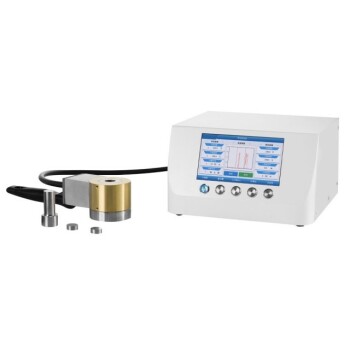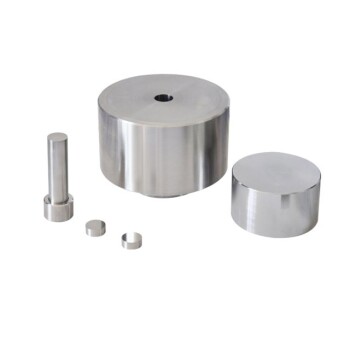In a modern laboratory, a hydraulic press is a foundational tool for a wide range of scientific disciplines. Primarily, laboratories focused on materials science, chemistry, and biology benefit from its ability to apply significant, highly controlled force for tasks ranging from material strength testing to the preparation of analytical samples.
The core value of a hydraulic press in a laboratory is not simply its power, but its precision. It transforms brute force into a repeatable, controllable variable, enabling more accurate sample preparation and more reliable material analysis.

Why a Press is a Core Laboratory Instrument
A hydraulic press operates on a simple principle: a small force applied to a confined fluid generates a much larger force on a larger surface. This mechanical advantage is what allows a user to exert immense pressure with minimal effort.
From Brute Force to Precise Control
Unlike cruder methods of applying force, a modern lab press provides an extremely high degree of control. Operators can set and monitor the exact pressure being applied, ensuring that conditions are identical from one test to the next.
This precision removes operator-dependent variability and is fundamental to creating reproducible scientific results.
The Foundation for Repeatable Experiments
In science, repeatability is paramount. The hydraulic press ensures that every sample is prepared or tested under the exact same conditions, which is critical for comparing data and drawing valid conclusions.
Whether you are creating a pellet for spectroscopic analysis or testing the failure point of a new alloy, the press provides a stable and reliable platform.
Key Applications Across Laboratory Types
The versatility of the hydraulic press means its applications are widespread, but they generally fall into two categories: sample preparation and material testing.
Materials Science & Engineering
This is perhaps the most common application. A press is used to test the fundamental properties of materials by subjecting them to controlled stress.
This includes compressive strength testing, where a material is squeezed until it deforms or breaks, and tension testing, where specialized jigs are used to pull a material apart to measure its tensile strength and elasticity.
Chemistry & Spectroscopy
In analytical chemistry, sample uniformity is key. A hydraulic press is used to create solid pellets from powdered samples, most notably KBr (potassium bromide) pellets for FTIR spectroscopy.
Pressing the powder into a thin, transparent pellet allows infrared light to pass through it, yielding a clean and reliable spectrum for analysis. This process is quick, easy, and highly repeatable.
Biology & Pharmaceuticals
In biological labs, high pressure can be used for cell lysis, which is the process of breaking open cells to release their contents for study.
It can also be used for extraction, applying immense pressure to plant or tissue samples to squeeze out oils, fluids, or other chemical compounds for analysis or product development.
The Added Dimension: Heated Hydraulic Presses
For many advanced materials, pressure alone is not enough. Heated hydraulic presses add a second critical variable: temperature.
Combining Heat and Pressure
These presses integrate heating elements into the platens (the flat plates that apply the pressure). This allows an operator to simultaneously heat and compress a material with high precision.
The combination of controlled heat and pressure is essential for initiating chemical reactions, molding polymers, or bonding layers of different materials together.
Applications in Polymers and Composites
Heated presses are indispensable in polymer science and composite material development. They are used for molding, shaping, and curing plastics and resins.
They are also used for laminating, where layers of materials are bonded together under heat and pressure to create composites with enhanced strength, flexibility, or thermal resistance.
Understanding the Key Benefits
Choosing a hydraulic press is an investment in reliability, efficiency, and safety. Its core advantages make it a cost-effective tool for demanding laboratory environments.
Precision and Repeatability
The ability to dial in and maintain a specific force ensures that experimental conditions are consistent. This leads directly to higher-quality, more dependable data.
Efficiency and Versatility
A single press can serve multiple functions within a lab, from simple pellet pressing to complex material strength tests. It accomplishes these tasks with far more force and less effort than manual alternatives.
Safety and Low Maintenance
Laboratory presses are designed with safety features like pressure relief valves and safety guards to prevent overloading and protect the operator. Their simple hydraulic design also means they require minimal maintenance over their lifespan.
Is a Hydraulic Press Right for Your Lab?
To determine if this tool fits your needs, consider your primary experimental goals.
- If your primary focus is material property analysis: A hydraulic press is essential for conducting standardized tests on the compressive and tensile strength of metals, ceramics, and polymers.
- If your primary focus is sample preparation for spectroscopy: A press is the most reliable tool for creating uniform, high-quality solid pellets for techniques like FTIR.
- If your primary focus is polymer or composite development: A heated hydraulic press is invaluable for molding, curing, and laminating materials under precisely controlled conditions.
Ultimately, a hydraulic press is a foundational tool that empowers you to generate more reliable data by controlling a fundamental physical variable.
Summary Table:
| Laboratory Type | Key Applications |
|---|---|
| Materials Science & Engineering | Compressive strength testing, tension testing |
| Chemistry & Spectroscopy | KBr pellet preparation for FTIR analysis |
| Biology & Pharmaceuticals | Cell lysis, extraction of compounds |
| Polymers & Composites (with heated press) | Molding, curing, laminating materials |
Ready to elevate your lab's precision and efficiency? KINTEK specializes in high-quality lab press machines, including automatic, isostatic, and heated hydraulic presses, designed to meet the rigorous demands of materials science, chemistry, and biology laboratories. Our equipment ensures superior control, repeatability, and safety for tasks like sample preparation, material testing, and polymer development. Contact us today to discuss how our solutions can optimize your experiments and deliver reliable results!
Visual Guide

Related Products
- Laboratory Hydraulic Press 2T Lab Pellet Press for KBR FTIR
- Automatic Laboratory Hydraulic Press Lab Pellet Press Machine
- Manual Laboratory Hydraulic Press Lab Pellet Press
- Manual Heated Hydraulic Lab Press with Integrated Hot Plates Hydraulic Press Machine
- Laboratory Hydraulic Press Lab Pellet Press Button Battery Press
People Also Ask
- How are hydraulic presses used in spectroscopy and compositional determination? Enhance Accuracy in FTIR and XRF Analysis
- What are some laboratory applications of hydraulic presses? Boost Precision in Sample Prep and Testing
- How is a laboratory hydraulic press used for Tb(III)-Organic Framework FT-IR samples? Expert Pellet Pressing Guide
- What role does a laboratory hydraulic press play in carbonate powder prep? Optimize Your Sample Analysis
- What is the role of a hydraulic press in KBr pellet preparation for FTIR? Achieve High-Resolution Chemical Insights



















